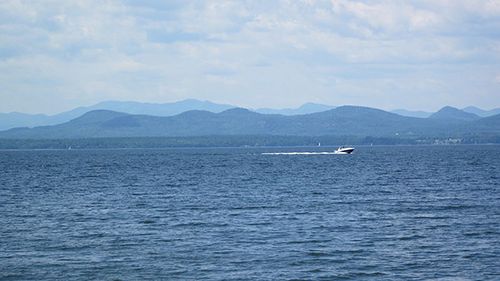May 16 2016 Tri-sector partnership aims to clean up Vermont’s Lake Champlain
 Lake Champlain serves many purposes for the people of Vermont, from allowing for recreational activities like fishing, swimming, and boating, to providing drinking water and attracting a workforce to the northeast section of the state. But these activities are at risk from polluted runoff that is entering the lake and causing levels of phosphorous and other pollutants to rise. A new partnership between the Vermont Department of Environmental Conservation, Vermont’s chapter of The Nature Conservancy, and Keurig Green Mountain, Inc. aims to address the water quality challenges in Lake Champlain, reports Vermont Business Magazine.
Lake Champlain serves many purposes for the people of Vermont, from allowing for recreational activities like fishing, swimming, and boating, to providing drinking water and attracting a workforce to the northeast section of the state. But these activities are at risk from polluted runoff that is entering the lake and causing levels of phosphorous and other pollutants to rise. A new partnership between the Vermont Department of Environmental Conservation, Vermont’s chapter of The Nature Conservancy, and Keurig Green Mountain, Inc. aims to address the water quality challenges in Lake Champlain, reports Vermont Business Magazine.
Vermont has a history of cross-sector collaboration with its Clean Water Initiative, a partnership among City and State agencies, local and regional partners, farmers, businesses, and the public to ensure the public’s access to clean and safe water throughout the state. By bringing these diverse partners together, the Initiative aims to improve smart farm practices, reduce polluted runoff from developed lands like highways and roads, use the state’s “natural infrastructure” to reduce stormwater pollution and erosion, and support cities and farmers in meeting the state’s clean water goals.
The new tri-sector initiative builds on this existing work to target Lake Champlain. “We know that improving and maintaining water quality is a complex challenge that requires the collaboration of private and public sector organizations,” explained Monique Oxender, Keurig’s Chief Sustainability Officer.
One of the collaboration’s first goals will be to jointly develop the Clean Water Roadmap, a watershed management tool that will help prioritize water quality projects across Vermont, including evaluations for phosphorus reduction in the Vermont portion of the Lake Champlain watershed. The Roadmap provides an excellent example of how a collaboration can Build a Common Fact Base — the consensus among collaboration partners as to what facts relating to the issue are most relevant. Joint recognition of what data is relevant to the collaboration allows participants to determine how best to proceed, before moving on to Share a Vision of Success. According to Deb Markowitz, Secretary of the Agency of Natural Resources, “The Clean Water Roadmap will allow us to be strategic and target the biggest water pollution sources for cleanup first.”
In addition to creating the roadmap, the collaboration will also work to conserve and restore parcels along the Lake Champlain corridor to prevent further phosphorus run-off and rebuild flood plains that naturally filter out nutrients. “Nature-based solutions are a win-win for many of the environmental challenges we face today,” Heather Furman, State Director for The Nature Conservancy, told Vermont Business Magazine. “By harnessing and restoring our natural assets such as floodplains, we can cost effectively clean our waters while providing habitat for wildlife and improving flood resiliency.”
